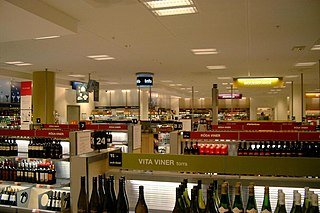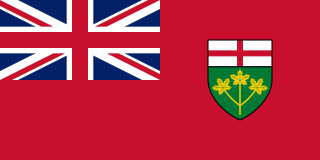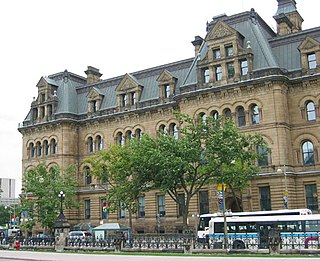The Progressive Party of Canada was a federal-level political party in Canada in the 1920s until 1930. It was linked with the provincial United Farmers parties in several provinces, and it spawned the Progressive Party of Saskatchewan, and the Progressive Party of Manitoba, which formed the government of that province. The Progressive Party was part of the farmers' political movement that included federal and provincial Progressive and United Farmers' parties.
The Scotties Tournament of Hearts is the annual Canadian women's curling championship, sanctioned by Curling Canada, formerly called the Canadian Curling Association. The winner goes on to represent Canada at the women's world curling championships. Since 1985, the winner also gets to return to the following year's tournament as "Team Canada". It is formally known as the "Canadian Women's Curling Championship".
The Orders, decorations, and medals of the Canadian provinces, in which each province of Canada has devised a system of orders and awards to honour residents for actions or deeds that benefit their local community or province, are in turn subsumed within the Canadian honours system. Each province sets their own rules and criteria on eligibility and also how each medal is awarded and presented. Most of the orders allow for the recipient to wear their orders in public, and most grant the recipients the use of post-nominal letters in their names.
The Ontario Temperance Act was a law passed in 1916 that led to the Prohibition of alcohol in Ontario. When the act was first enacted, the sale of alcohol was prohibited, but liquor could still be manufactured in the province or imported. Strong support for prohibition came from religious elements of society such as pietistic Protestants, especially Methodists, seeking to eliminate what they considered the evil effects of liquor, including violence, family abuse, and political corruption. Historically, temperance advocates in Ontario drew inspiration from the movement in the United States.
The prohibition of alcohol in Canada arose in various stages, from local municipal bans in the late 19th century, to provincial bans in the early 20th century, and national prohibition from 1918 to 1920. The relatively large and powerful beer and alcohol manufacturing sector, and the huge working class that purchased their products, failed to convince any of the governments to reverse their stance on prohibition. Most provinces repealed their bans in the 1920s, though alcohol was illegal in Prince Edward Island from 1901 to 1948. By comparison the temperance act in Ontario ran from 1916 to 1927.

An alcohol monopoly is a government monopoly on manufacturing and/or retailing of some or all alcoholic beverages, such as beer, wine and spirits. It can be used as an alternative for total prohibition of alcohol. They exist in all Nordic countries except mainland Denmark, and in all provinces and territories in Canada except Alberta. In the United States, there are some alcoholic beverage control states, where alcohol wholesale is controlled by a state government operation and retail sales are offered by either state or private retailers. An alcohol monopoly also formerly existed in Taiwan between 1947 and 2002, when the Taiwanese market was opened to overseas brands as part of its admission to the WTO in 2002.
An Ontario prohibition plebiscite was held on January 1, 1894, in conjunction with municipal elections under the Prohibition Plebiscite Act, on the legality of alcoholic beverages and the implementation of prohibition. Though the plebiscite passed, the results were non-binding and prohibition would not occur in Ontario until 1916.
An Ontario prohibition referendum was held on December 4, 1902, under the Liquor Act, on the legality of alcoholic beverages and the implementation of prohibition in the province. Though the referendum passed, a majority of half of the voters in the 1898 election did not support the motion and prohibition was not introduced. Prohibition would not occur in Ontario until 1916.
An Ontario prohibition referendum was held on October 20, 1919, on the repeal of the prohibition of alcoholic beverages. Prohibition had been passed by the provincial government in 1916 under the Ontario Temperance Act, though a clause required a referendum to be held on the issue after three years.
An Ontario prohibition referendum was held on October 23, 1924 on the repeal of the Ontario Temperance Act. The referendum was brought about by a clause in the Act, which permitted the possible repeal of prohibition by a majority vote.
Canadian Crown corporations are state-owned enterprises owned by the Sovereign of Canada. They are established by an Act of Parliament or Act of a provincial legislature and report to that body via a minister of the Crown in the relevant cabinet, though they are "shielded from constant government intervention and legislative oversight" and thus "generally enjoy greater freedom from direct political control than government departments."
This is a list of elections in Canada in 2009. Included are provincial, municipal and federal elections, by-elections on any level, referendums and party leadership races at any level.
Canadian Liquor Plebiscites were held on October 25, 1920 in the provinces of Alberta, Manitoba, Nova Scotia and Saskatchewan under the Canada Temperance Act and the Dominion Elections Act.
In some provinces of Canada, Family Day is a statutory holiday occurring on the third Monday in February. In the provinces of British Columbia (BC), Alberta, Ontario, New Brunswick and Saskatchewan it is observed as Family Day. In three other provinces, the same day is a statutory holiday but celebrated for different reasons: Louis Riel Day in Manitoba, Nova Scotia Heritage Day in Nova Scotia, and Islander Day in Prince Edward Island. Two-thirds of Canadians live in a province that observes a February statutory holiday. In the United States, Presidents Day is also celebrated on the third Monday in February. Some provinces have changed the observance day of their holiday to match the other provinces and/or the American holiday.

The 2010 Canadian Mixed Curling Championship was held Nov. 14-21, 2009 at the Burlington Golf and Country Club in Burlington, Ontario. Nova Scotia won its seventh Mixed title, and skip Mark Dacey won his second title with wife, Heather as his mate.
The 1961 Dominion Diamond "D" Championship was the very first Canadian women's curling championship. It was held at the Ottawa Hunt and Golf Club February 27 to March 3. The format was a round robin, and a playoff was held to determine 2nd place due to a three-way tie. Joyce McKee and her rink from Saskatoon, who were the unofficial national ladies' champion from 1960, won her first of five national championships, by posting an undefeated 9-0 record.

The men's soccer tournament at the 2013 Canada Summer Games was held at the Université de Sherbrooke Stadium and Bishop's University in Sherbrooke, Quebec.
The 1979 Macdonald Brier, Canada's national men's curling championship was held from March 4 to March 10 at the Ottawa Civic Centre in Ottawa.
The 1978 Macdonald Brier, Canada's national men's curling championship was held March 5–10 at the Pacific Coliseum in Vancouver.






